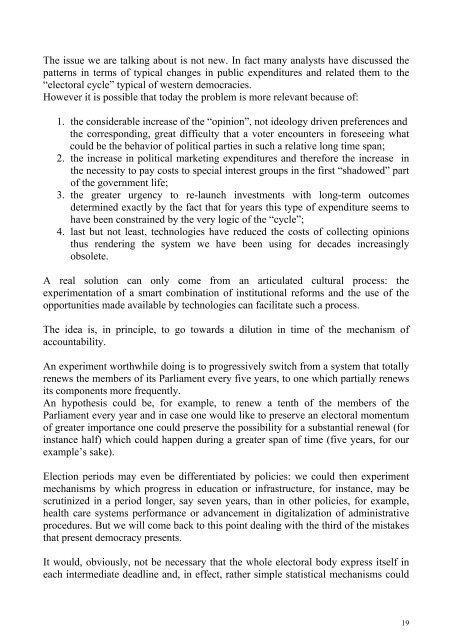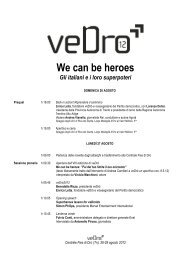democracy - Vision the Italian Think Tank
democracy - Vision the Italian Think Tank
democracy - Vision the Italian Think Tank
Create successful ePaper yourself
Turn your PDF publications into a flip-book with our unique Google optimized e-Paper software.
The issue we are talking about is not new. In fact many analysts have discussed <strong>the</strong>patterns in terms of typical changes in public expenditures and related <strong>the</strong>m to <strong>the</strong>“electoral cycle” typical of western democracies.However it is possible that today <strong>the</strong> problem is more relevant because of:1. <strong>the</strong> considerable increase of <strong>the</strong> “opinion”, not ideology driven preferences and<strong>the</strong> corresponding, great difficulty that a voter encounters in foreseeing whatcould be <strong>the</strong> behavior of political parties in such a relative long time span;2. <strong>the</strong> increase in political marketing expenditures and <strong>the</strong>refore <strong>the</strong> increase in<strong>the</strong> necessity to pay costs to special interest groups in <strong>the</strong> first “shadowed” partof <strong>the</strong> government life;3. <strong>the</strong> greater urgency to re-launch investments with long-term outcomesdetermined exactly by <strong>the</strong> fact that for years this type of expenditure seems tohave been constrained by <strong>the</strong> very logic of <strong>the</strong> “cycle”;4. last but not least, technologies have reduced <strong>the</strong> costs of collecting opinionsthus rendering <strong>the</strong> system we have been using for decades increasinglyobsolete.A real solution can only come from an articulated cultural process: <strong>the</strong>experimentation of a smart combination of institutional reforms and <strong>the</strong> use of <strong>the</strong>opportunities made available by technologies can facilitate such a process.The idea is, in principle, to go towards a dilution in time of <strong>the</strong> mechanism ofaccountability.An experiment worthwhile doing is to progressively switch from a system that totallyrenews <strong>the</strong> members of its Parliament every five years, to one which partially renewsits components more frequently.An hypo<strong>the</strong>sis could be, for example, to renew a tenth of <strong>the</strong> members of <strong>the</strong>Parliament every year and in case one would like to preserve an electoral momentumof greater importance one could preserve <strong>the</strong> possibility for a substantial renewal (forinstance half) which could happen during a greater span of time (five years, for ourexample’s sake).Election periods may even be differentiated by policies: we could <strong>the</strong>n experimentmechanisms by which progress in education or infrastructure, for instance, may bescrutinized in a period longer, say seven years, than in o<strong>the</strong>r policies, for example,health care systems performance or advancement in digitalization of administrativeprocedures. But we will come back to this point dealing with <strong>the</strong> third of <strong>the</strong> mistakesthat present <strong>democracy</strong> presents.It would, obviously, not be necessary that <strong>the</strong> whole electoral body express itself ineach intermediate deadline and, in effect, ra<strong>the</strong>r simple statistical mechanisms could19





